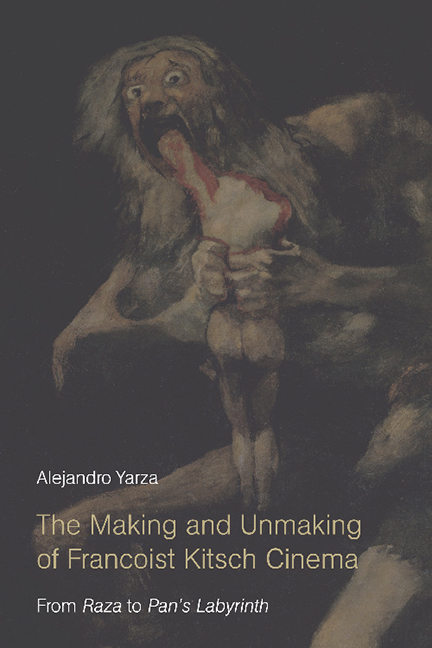Book contents
- Frontmatter
- Contents
- List of Figures
- Acknowledgments
- Preface
- Introduction
- 1 The Petrified Tears of General Franco: Kitsch and Fascism in José Luis Sáenz de Heredia’s Raza
- 2 Romancero Marroquí and the Francoist Kitsch Politics of Time
- 3 Los últimos de Filipinas: The Spatio-temporal Coordinates of Francoism
- 4 Surcos: Neorealism, Film Noir, and the Puppet Master
- 5 Franco, Ese Hombre: From Kitsch-Artist to Kitsch-Man
- 6 Viridiana: The World, the Flesh, and the Devil
- 7 Balada Triste De Trompeta: Of Ghosts and Clowns
- 8 Under the Sign of Saturn: The Labyrinth of Moral Choices in Francoist Spain
- Works Cited
- Index
6 - Viridiana: The World, the Flesh, and the Devil
Published online by Cambridge University Press: 10 November 2020
- Frontmatter
- Contents
- List of Figures
- Acknowledgments
- Preface
- Introduction
- 1 The Petrified Tears of General Franco: Kitsch and Fascism in José Luis Sáenz de Heredia’s Raza
- 2 Romancero Marroquí and the Francoist Kitsch Politics of Time
- 3 Los últimos de Filipinas: The Spatio-temporal Coordinates of Francoism
- 4 Surcos: Neorealism, Film Noir, and the Puppet Master
- 5 Franco, Ese Hombre: From Kitsch-Artist to Kitsch-Man
- 6 Viridiana: The World, the Flesh, and the Devil
- 7 Balada Triste De Trompeta: Of Ghosts and Clowns
- 8 Under the Sign of Saturn: The Labyrinth of Moral Choices in Francoist Spain
- Works Cited
- Index
Summary
In mourning it is the world which has become poor and empty; in melancholia it is the ego itself
—Sigmund Freud, Mourning and MelancholiaThe return of Luis Buñuel to Spain in 1960 for the filming of Viridiana coincides with the period of Spanish apertura, when, in an attempt to gain international legitimacy, Franco opened up the country to the outside world. Promised total creative control, Buñuel came to Spain after twenty-two years in exile to shoot the film, a welcome decision by the Francoist government, which saw in the return of the world-renowned filmmaker—a former close friend of Salvador Dalí and Federico García Lorca—a rare opportunity to score major political points. For Buñuel, however, it was an equally rare opportunity to burst from the inside the Francoist kitsch melancholy bubble to expose its perverse, repressive political contents.
The circumstances surrounding Viridiana's scandal are widely known: Viridiana represented Spain at the Cannes Film Festival, where it won the prestigious Palme d’Or. Deeply humiliated by the condemnatory remarks made against the film by the Vatican's newspaper L’Osservatore Romano after the award was announced, accusing the film of blasphemy, the Francoist government withdrew its support and emphatically banned it. A Francoist censor issued a scathing new report: “blasphemous, profane. Cruel and contemptuous of the poor. Also morbid and savage. A poisonous, corrosive film with great cinematographic skill for coordinating images, overtones, and soundtrack” (quoted in Sánchez Vidal 256). More than just an anecdote revealing the inner contradictions of Francoist Spain during its aperturista attempt to modernize the country, Viridiana's scandal is emblematic of a film, which—as we will see in the following pages—can be read as an allegory of the historical evolution of Franco's post-war Spain. Ironically, then, the external circumstances surrounding the film could be seen as thematically related to its script. Viridiana is a cinematic time bomb Buñuel came to Franco's Spain to deliver; a film that not only accurately portrayed the first two decades of Franco's regime but also anticipated its dramatic transformation during the next fifteen years and beyond.
Pressured both by the failures of its isolationist policies and the changes in the politico-economic climate of the West during the second half of the 1950s, Franco's Spain was forced to open up to a process of modernization to secure the regime's political and economic survival.
- Type
- Chapter
- Information
- The Making and Unmaking of Francoist Kitsch CinemaFrom Raza to Pan's Labyrinth, pp. 179 - 202Publisher: Edinburgh University PressPrint publication year: 2017



